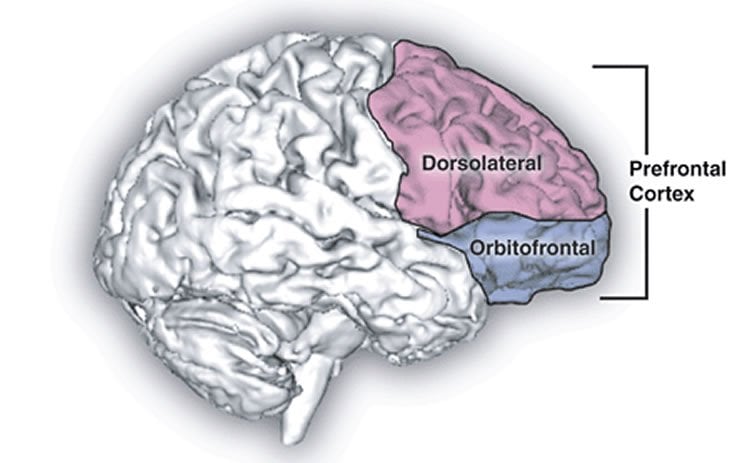An estimated 2.3 million individuals are living with multiple sclerosis (MS) worldwide. Approximately half of all individuals with MS experience changes in cognition such as impaired concentration, attention, memory, and judgment. The underlying brain basis for these deleterious effects has been largely elusive. New findings published yesterday in Neuropsychology reveal that decreased connectivity between network-specific brain regions are to blame for the central deficit common to the various cognitive changes associated with MS, slowed cognitive speed.
In the first study of its kind, researchers at the Center for BrainHealth at The University of Texas at Dallas and The University of Texas Southwestern Medical Center found that, compared to healthy controls, individuals with MS exhibit weaker brain connections between the dorsolateral prefrontal cortex and posterior brain regions. The change amounts to a breakdown in communication between the part of the brain responsible for executing goal-directed thought and action and the regions responsible for carrying out tasks related to cognitive speed such as visual processing, motor execution, and object recognition. The researchers believe that the diminished connections are likely the result of decreased white matter surrounding the neurons in the brain.
“Our study is the first to really zero in on the physiology of cognitive speed, the central cognitive deficit in MS,” explained Center for BrainHealth principal investigator Bart Rypma, Ph.D., who also holds the Meadows Foundation Chair at UT Dallas. “While white matter is essential to efficient network communication, white matter degradation is symptomatic of MS. This study really highlights how tightly coupled connectivity is to performance and illuminates the larger, emerging picture of white matter’s importance in human cognitive performance.”

Collaborating with Elliot Frohman, M.D., Ph.D., director of the Multiple Sclerosis Program and Clinical Center at UT Southwestern, the study recruited 29 participants with relapsing-remitting MS and 23 age- and sex- matched healthy controls. Participants underwent functional magnetic resonance imaging (fMRI) while completing a measure of cognitive processing speed. Participants were given 4 seconds to view a nine-item key of number and symbol pairs (for example ‘+’ above the number 3) and one number-symbol pair probe. Participants were asked to indicate with a left or right thumb button press whether or not the probe appeared in the key.
While accuracy was similar for both healthy controls and individuals with MS, response times for individuals with MS were much slower. Analysis of the fMRI data revealed that while completing this measure, MS patients showed weaker functional connections with dorsolateral prefrontal cortex.
“These findings reveal a diffuse pattern of disconnectivity with executive areas of the brain,” explained the study’s lead author, Nicholas Hubbard, a doctoral candidate at the Center for BrainHealth working with Dr. Rypma. “Importantly, these decreases in connectivity predicted MS-related cognitive slowing both in and out of the fMRI environment suggesting that these results were not specific to our task, but rather were able to generalize to other situations where cognitive speed is required.”
This research supports the need for therapies that target white matter structures and white matter proliferation. Rypma and Hubbard are currently conducting research to further explore the physiology of white matter to better understand cognitive speed reductions not only in MS, but also in healthy aging individuals.
Funding: The National Multiple Sclerosis Society (RG4453A1/2) and the Friends of BrainHealth Linda and Joel Robuck Distinguished New Scientist award provided funding for this study.
Source: Emily Bywaters – UT Center for Brain Health
Image Credit: Image is credited to Zahr et al. and is in the public domain
Original Research: Abstract for “Asynchrony in Executive Networks Predicts Cognitive Slowing in Multiple Sclerosis” by Hubbard, Nicholas A.; Hutchison, Joanna L.; Turner, Monroe P.; Sundaram, Saranya; Oasay, Larry; Robinson, Diana; Strain, Jeremy; Weaver, Travis; Davis, Scott L.; Remington, Gina M.; Huang, Hao; Biswal, Bharat B.; Hart Jr., John; Frohman, Teresa C.; Frohman, Elliot M.; and Rypma, Bart in Neuropsychology. Published online July 6 2015 doi:10.1037/neu0000202
Abstract
Asynchrony in Executive Networks Predicts Cognitive Slowing in Multiple Sclerosis
Objective: Cognitive slowing is a core neuropsychological symptom of Multiple Sclerosis (MS). We aimed to assess the extent to which cognitive slowing in MS was predicted by changes in dorsolateral prefrontal networks. Method: We assessed patients with relapsing-remitting MS and healthy controls (HCs) on measures of processing speed. Participants underwent a functional MRI while performing a processing speed task to allow assessment of task-based connectivity.
Results: Patients were slower than HCs on the processing speed tasks. Patients showed attenuated connectivity between right and left dorsolateral prefrontal cortex (DLPFC) and task-relevant brain regions compared to HCs during processing speed task performance. Patients’ connectivity with DLPFC in these group-disparate networks accounted for significant variability in their performance on processing speed measures administered both in and out of the imaging environment. Specifically, patients who had stronger functional connections with DLPFC in group-disparate networks performed faster than patients with weaker connections with DLPFC in group-disparate networks.
Conclusion: Results suggest that MS-related cognitive slowing can be accounted for by systemic alterations in executive functional networks.
Asynchrony in Executive Networks Predicts Cognitive Slowing in Multiple Sclerosis” by Hubbard, Nicholas A.; Hutchison, Joanna L.; Turner, Monroe P.; Sundaram, Saranya; Oasay, Larry; Robinson, Diana; Strain, Jeremy; Weaver, Travis; Davis, Scott L.; Remington, Gina M.; Huang, Hao; Biswal, Bharat B.; Hart Jr., John; Frohman, Teresa C.; Frohman, Elliot M.; and Rypma, Bart in Neuropsychology. Published online July 6 2015 doi:10.1037/neu0000202






